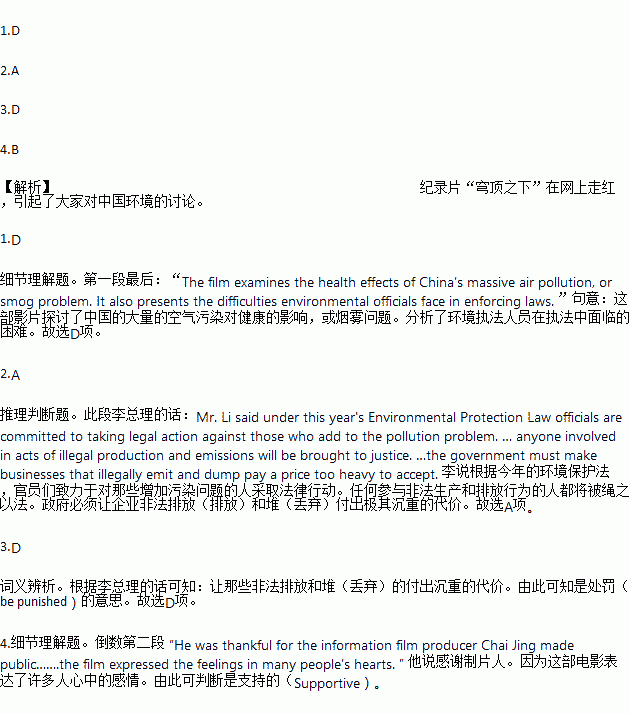题目内容
The documentary “Under the Dome” went viral (走红)online just before Chinese lawmakers opened their yearly meeting. The film examines the health effects of China’s massive air pollution, or smog problem. It also presents the difficulties environmental officials face in enforcing laws.
A former reporter for China’s state-run television, Chai Jing, produced the documentary. It argues that state-run businesses, especially energy companies, are part of China’s pollution problem.
At the end of National People’s Congress meeting, a reporter asked Prime Minister Li Keqiang whether he thought the film was correct. Are big oil companies barriers to environmental law enforcement? Mr. Li said under this year's Environmental Protection Law officials are committed to taking legal action against those who add to the pollution problem. He said anyone involved in acts of illegal production and emissions will be brought to justice. He said the government must make businesses that illegally emit(排放) and dump(丢弃) pay a price too heavy to accept.
Others also commented on the film before it was banned, including former basketball star Yao Ming. Mr. Yao served as a representative at the legislative meetings. He said he had watched the film and was thankful for the information film producer Chai Jing made public. He said the film expressed the feelings in many people’s hearts.
A respiratory(呼吸的) expert and representative at the legislative(立法的) meetings also spoke to VOA about “Under the Dome.” Zhong Nanshan said Chai Jing’s film takes a good look at where smog comes from, how harmful it is and the efforts being taken to deal with it. Previously, Mr. Zhong said that China’s smog is an even scarier problem than the serious illness SARS.
1.The documentary “Under the Dome” suggests that ______.
A. water pollution in China has very bad effect on people’s health.
B. energy companies take all the blame for China’s pollution.
C. all the state-run companies know nothing about environment protection.
D. China’s environmental departments face troubles when dealing with pollution.
2.From Para.3, we can infer that ______
A. The Chinese government will take more measures to deal with air pollution.
B. Companies must pay a lot of money before they cause some pollution.
C. Prime Minister Li praised environmental officials.
D. Prime Minister Li doesn’t think highly of the film.
3.What does the underlined phrases “be brought to justice” probably mean?
A. Be questioned B. Be removed
C. Be grounded D. Be punished
4.What is Yao Ming’s attitude to the film “Under the Dome”?
A. Indifferent B. Supportive
C. Doubtful D. Negative
 阅读快车系列答案
阅读快车系列答案
